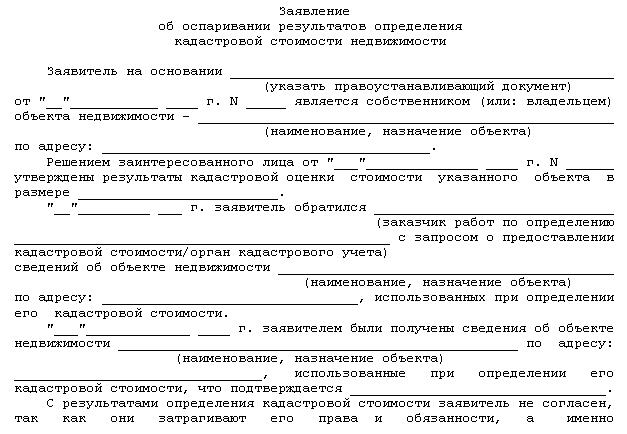Contestation of the cadastral value of real estate objects

Full transition to the market relations created a large number of problems for real estate owners, which never used to occur. One of such novels in legislation is the Institute of Object evaluation related to the land called the cadastral value.
Previously this meaning had a value that displayed expenses for building of the object taking into account amortizing deterioration. At the present time the cadastral value displays more characteristics that affect formation of the house, flat or other real estate object. The cadastral value reached close to the market value established on the basis of demand and proposition.
Why is it necessary to challenge the cadastral value of real estate?
Amendments adopted at the end of 2017 allow the owner to reduce this parameter. The mechanism is involved in disagreement with the evaluation set by municipal authorities. Previously, it was conducted without the participation of the owner and not reflect his opinion. A fair cadastral value is significant in the following cases:
- The rent payment for land property is set on its basis;
- Accordingly, it forms a budget for land purchased for state or municipal needs;
- The value of objects while concluding agreements of sale and purchase. From that moment, it cannot be lower than its cadastral value;
- It plays a role in hereditary legal relations, as it allows more fair evaluation of the mass of the succession and distribute it among the heirs.
Who defines the cadastral value of the real estate?
The powers to determine the value of land and the objects attached to it are transferred to municipal authorities. Large-scale work on the inventory of objects and land was started in the 2000s. By January 2014, all objects under the jurisdiction of municipalities were evaluated and entered to the Unified register. The powers of municipalities to determine the value of the object were delegated to independent real estate experts on the basis of contracts. In the course of the inventory, a large number of demerits were revealed. They depended on:
- qualification level of expert organizations’ employees;
- fluctuations in market prices for the currency in the valuation period;
- imperfection of evaluation techniques, which appraisers used when determining prices for various objects (lands of various purposes, residential, commercial industrial objects, etc.).
These shortcomings led to numerous complaints of overestimation of the value of objects. There was a flood of complaints and lawsuits to the courts demanding to contest the cadastral value of the real estate objects. These circumstances caused the need to amend the mechanism for its definition and the creation of specialized commissions. Until 2018, the appeal to the commission with an application for changing the size of the cadastral value was mandatory. Since the beginning of 2018, the contestation of the cadastral value of real estate objects has become simpler. Now the owner or the stakeholder is entitled to appeal an unfair evaluation, from his point of view.
Contestation of the cadastral value of the real estate objects. Mechanism of contestation
Until 2018, the owner who disagreed with results of the evaluation, was obliged to file an application with the commission created by the decision of the Government Register’s authority within the serviced territory. Commissions are permanent.
The Commission for Challenging the Cadastral Value consists of:
- representative of the municipal authority (local executive authority);
- representative of the Government Register (local department);
- officer of the Property Relations Department;
- representative of the self-regulated organizations of the real estate owners.
While submitting the application, the technical officer is obliged to the applicant the following information:
- the procedure of submitting the application;
- provide him with the entire list of documents to be attached to the application;
- clarify the peculiarities regarding evaluation of the disputed object;
- provide with information concerning the amount of the state fee for the application processing;
- explain about the mechanism of challenging the decision of the commission in case of disagreement with its conclusions.
All decisions accepted in relation to applications on contestation of the cadastral value. They are published in free access on the electronic resource of the administration of the region in the section on property relations.
Court appeal procedure
Court procedure means that the party presenting a claim disagrees with the activity of the executive authority. In other words, while contesting the cadastral value of the real estate object, the applicant doubts the competence of the officers authorized to conduct the evaluation. To do this, he must have relevant backgrounds. Therefore, according to the Resolution of the Plenum of the Supreme Court, the courts accept such applications only in the following cases:
- When the value was set on the basis of the invalid data regarding the real estate object;
- In case the market value of the object has already been established for the moment of its determination.
Compliance with this order of the contestation of the cadastral value of the real estate object is mandatory for legal entities, individual entrepreneurs, state and municipal authorities. There is an exception for individuals. According to the law “On evaluation activity” (paragraph 3 Article 24.18), appealing to the commission is not mandatory for them.
There is a deadline to challenge the cadastral value for the real estate in the court order.It is equal to 5 years. But missing the deadline is not a background for refusing to accept the application, if the data on the evaluation of the object are not included in the Unified State Register of the Real Estate. In this case, the missed period can be restored.
Contents of the challenge statement
According to the contents of the application to challenge the cadastral value of real estate, the documents submitted to the commission and the court do not fundamentally distinct from each other in the reasoning part. Sample application to be submitted to the commission:

For processing of the application as quickly as possible without any backgrounds to refuse or daley it by the competent authority, the following documents must be attached to the application:
- Cadastral passport to the object that serves as a dispute subject (in relation to the house, flat, building, land);
- Writ of possession/disposal in relation to the real estate object;
- Documentary confirmation of inaccuracy in the calculation of the value of the object (incorrect methodology, counting error, use of documents related to other object, etc.);
- Conclusion of independent evaluating expert who is a member of the self-regulated organization.
Legal implications of appellation
Contestation of the cadastral value of the real estate may lead to different legal implications in csae of consideration by the commission or in the court order. In first case there are following backgrounds for refusal of the commission:
- Uncertainty;
- Inaccuracy;
- Incorrect argumentation.
provided on the application or investigated in the proccess of consideration of provided documents.
Two options are possible:
- Rejection of the application indicating the true and accurate sources that were used by the commission to evaluate the object;
- Change in the direction of decrease, when identifying unreliable data.
The commission must notify the applicant about accepted decision no later than in 5 working days from the moment of processing the application.
This order is mandatory for each applicant except individuals.
The court uses the same documents that were provided by the applicant when appealing to the commission, with the attached decision of the commission, which the applicant does not agree with. Decision adopted by the court of first instance can also be appealed, in case of disagreement in a higher court, up to the Supreme Court. Challenging the cadastral value of the property and reviewing the decision in court can be initiated by the prosecutor in the manner of supervision.





